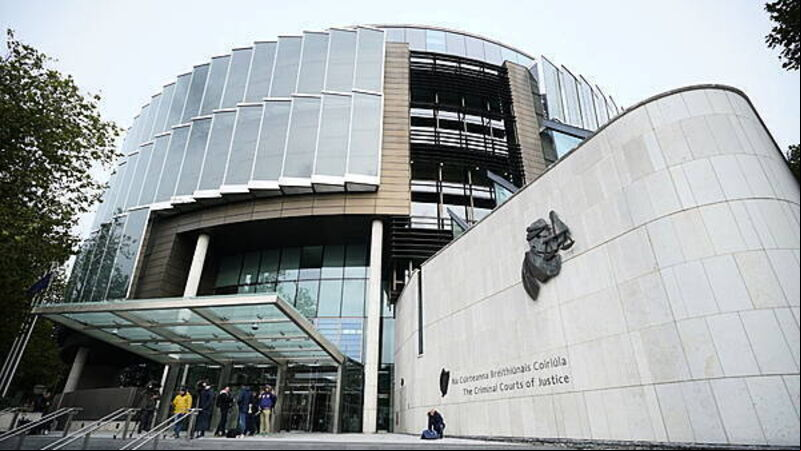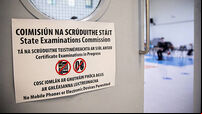Man avoids jail after three-year campaign of coercive control

Eimear Dodd and Isabel Hayes
A man who subjected his wife to a three-year campaign of coercive control has been given a three-year suspended sentence.
Ian Barry (44), of the Ashes, Trimleston, Goatstown, Dublin 14, was sent forward from the District Court on a signed guilty plea of coercive control on dates between 2019 and 2022 at another address in south Dublin.
Dublin Circuit Criminal Court heard evidence that Barry was verbally abusive towards the victim, calling her names including 'Adolf' and a 'liar'.
Barry also subjected her to physical violence by throwing objects at her.
He exerted financial control over her, forcing her to for every penny spent, the court heard. She was occasionally given a bank card to use to buy groceries, but Barry directed a set amount of her to spend. She also had to return with four bags of groceries, and Barry would inspect the receipts.
In 2019, Barry insisted she use her income from her new part-time job to pay for their groceries, instead of the bank card. He also sought to control and monitor her movements into and out of their then-home.
Sentencing Barry on Friday, Judge Martin Nolan said it was a “close run thing” but he had decided not to jail Barry. He said he made this decision to give Barry a chance due to mitigating factors, including his previous good record.
“If you harass your wife or in any way make her life miserable, you'll be brought back to this court and you won't escape that time,” the judge told Barry.
He told Barry: “Your behaviour was disgraceful” and “You have a lot to make up for.”
He handed down a three-year sentence and suspended it on a number of conditions.
The court heard that after their relationship ended in early 2022 and Barry had left their home, he continued to use a Ring doorbell camera to monitor the house.
He accessed it 32 times in one day, the court was told. The injured party later removed it.
Garda Ciara Larkin told Emer Ní Chúagáin BL, prosecuting, that the couple were married for 17 years, but are now separated.
The victim made a complaint to gardaí in late 2022. She outlined a pattern of coercive control in the final years of the relationship.
She said it began with Barry calling her names, and using abusive language towards her.
Threatening behaviour
He also used threatening behaviour, including raising his fist, or leaning forward as if to headbutt her, though he did not follow through on these threats.
Barry would be verbally abusive in some situations including if he wasn't happy with meals or considered the house untidy.
When the injured party expressed concerns, Barry told her to “fuck off, no one was listening”. She told gardaí she felt embarrassed and humiliated when Barry made remarks in front of others.
While working from home during the Covid-19 pandemic, Barry would observe the woman's movements into and out of the house from an upstairs window.
The woman started a new job during the period of Barry's offending. She told gardaí that Barry was pleased about the extra income for the household, but unhappy she was working.
Barry berated her for issues that arose while she was working. He also kicked the dishwasher if it wasn’t empty and threw meals on the floor or in the bin if he wasn't happy with them.
Physical violence
Gda Larkin outlined four specific instances of physical violence by Barry towards his then-wife between 2019 and 2022.
In the first incident, Barry threw a toilet roll at the victim while they were in the kitchen. It hit her eye and she had a mark afterwards. She was crying and in shock afterwards.
Separately, Barry threw a TV remote at her, hitting her collarbone. She got a fright and left the room crying.
In another incident, Barry - who had been drinking - pushed an office chair into her back, while she was cleaning on the floor in a bedroom. The injured party suffering bruising and pain.
Another incident of violence occurred around Christmas 2021, when Barry jabbed his fingers into the injured party's spine, after being verbally abusive and aggressive towards her.
Barry would be apologetic for a time after each of these incidents, before resuming his previous behaviour, Gda Larkin said.
The woman had to ask Barry's permission to leave the house to meet her sister and he would often become verbally abusive.
The court heard evidence that on multiple occasions, Barry asked her “what's in it for me” as an attempt to exchange sex for permission to leave the house.
The injured party told gardaí she consented to sex in these situations, but felt it was a way to placate him when he didn't want her to leave the house.
A victim impact statement was provided to the court and not read aloud.
Barry was voluntarily interviewed by gardaí in July 2023, and denied the allegations of coercive control.
He told gardaí he was “not a perfect husband” but added that he “hadn't done anything to warrant being in a garda station”. He said he had “never laid a finger” on the injured party.
When asked about the specific instances of physical violence, Barry described them as accidents. He itted calling the woman names during arguments, saying she was antagonising him. He called himself as a “victim” who was “being provoked” by the injured party.
Gda Larkin agreed with Silvia-Maria Crowley BL, defending, that her client co-operated with the investigation.
Ms Crowley put it to the garda that the couple were in financial difficulties at the time. Gda Larkin said she was not aware of this, but noted that the couple's financial liabilities were in Barry's name.
It was also accepted that Barry has not come to recent negative garda attention.
Ms Crowley asked the court to take into her client's very early guilty pleas, remorse, shame and acceptance of responsibility.
Several letters and other documents were handed to the court. Barry works as a senior software engineer.
Ms Crowley said her client was under financial stress and worried about a debt of around €85,000. He repaid €30,000 over a five-year period as part of personal insolvency arrangement.
Her client did not recognise his actions at the time as coercive control, but now realises his behaviour was “intolerable”, counsel said.









